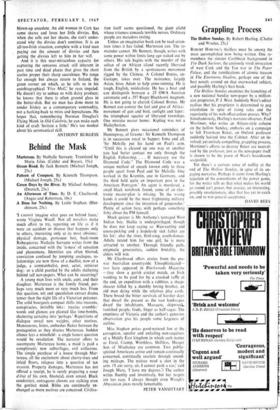Behind the Mask
Martereaa. By Nathalie Sarraute. Translated by Maria Jolas. (Calder and Boyars, 15s.) Ocean Road. By Jack Bennett. (Michael Joseph, 25s.) Pattern of Conquest. By Kenneth Thompson. (Michael Joseph, 25s.) Green Days by the River. By Michael Anthony. (Deutsch, 25s.) An Afternoon of Time. By D. E. Charlwood. (Angus and Robertson, 18s.) A Dam for Nothing. By Leslie Stephan. (Hut- chinson, 25s.) ' 'I CANNOT imagine what goes on behind faces,' wrote Virginia Woolf. Not all novelists make much effort to try, reporting on life as if it were an accident or disease that happens only to others, interesting only at its most obvious: physical damage, grotesque lust, back-room Robespierres. Nathalie Sarraute writes from the inside, concerned with the 'is-ness' of sensation and phenomena. Identities are often blurred, conviction confused by tempting analogies, re- lationships are now those of a duellist, now of a judge, a somnambulist, poet, actor, retriever dog: or a child puzzled by the adults sheltering behind tall newspapers. What can be occurring?
A young man lives with uncle, aunt, and their daughter. Martereau is the family friend, per- haps very much more or very much less. From this question, wit and speculation extract drama tenser than the night life of a Victorian poisoner. The solid bourgeois compact shifts into treasons, conspiracies, invisible inks: treaties crumble: words and glances are planted like time-bombs, shattering certainty into 'perhaps.' Repetitions of dialogue reveal new weights, other motives. Manoeuvres, feints, ambushes flicker between the protagonists as they discuss Martereau. Sudden silence lays a minefield: a single honest question would be revolution. The narrator offers to accompany Martereau home, a maid is paid a compliment; new subterfuges, evil collusions. The simple purchase of a house through Mar- tereau, all the excitement about cherry-trees and inlaid floors, relapses into a question of tax evasion. Property damages, Martereau has not offered a receipt, he is surely preparing a coup d'etat of his own, financial, even sexuaL Black condottieri, outrageous clowns are stalking even the gentlest mind. Roles are continually ex- changed as more motives are conceived. Civilisa-
tion itself seems questioned, the giant cliché whose triteness conceals terrible nerves. Ordinary people are matadors resting.
Unless an imaginative book can be read seven- teen times it has failed. Martereau can. The re- mainder cannot. Mr Bennett, though, writes with some power within limits long ago staked out by others. His tale _begins with the murder of the sultan of an African island recently liberated from the British by a spontaneous movement rigged by the Chinese. A Colonel Brutus, ex- Gestapo, takes over. The resistance, largely Asian, hires Adam to help arms-running. He is tough, English, unidealistic. He has a boat and can distinguish between a .25 OWA Austrian automatic and a .357 Ruger Blackhawk magnum. He is not going to cherish Colonel Brutus. Mr Bennett can convey the feel and give of Africa : movement of gun and bird, sunlight and leper: the triumphant squalor of liberated townships. One mistake nearer home: Kipling was not a Haileyburian.
Mr Bennett gives occasional reminders of Hemingway, of Greene: Sir Kenneth Thompson is in succession royal to Sapper; Irma and all. 'Sir Melville put his hand on Paul's arm. "Until this is cleared up one way or another you had better contact me only through the English Fellowship. . . . If necessary use the Diamond Code." The Diamond Code was a unique method of speech known only to three people apart from Paul and Sir Melville. One worked in the Kremlin, one in Germany, and the third held quite an important post in the American Pentagon.' An agent is murdered, a small black notebook found, some of an elec- tronic master-plan is missing. 'In the wrong hands it could be the most frightening military development since the invention of gunpowder.' Plenty of action here, with perhaps something fishy about the PM himself.
Much quieter is Mr Anthony's teenaged West Indian boy. Sheltie is underprivileged, though he does not keep saying so. Rice-cutting and cocoa-picking and a hopelessly sick father are his lot: also the river, bird-song, youth-dances. Adults intend him for one girl, he is more attracted to another. Through friendly guile, enigmatic generosities, sudden brutality, the elders will win.
Mr Charlwood offers stories from. the pre- war Australian countryside. Unsophisticated— two have appeared in Black woods Magazine —they show a garish cricket match, an Irish wedding to be paid for by a crooked raffle at the end, an expedition with a rabbiter, a sheep- shearer killed by a dumbly loving brother, an old man dying while the relatives play cards. There brood the bitter survivals of harsher days that dwarf the present as the vast landscapes dwarf the inhabitants. Massacre, shipwreck, vanished people, feuds, linger as half-sagas. The emptiness of Victoria and the author's generous observation give his people some largeness of outline.
Miss Stephan pokes good-natured fun at the corruption, squalor and unfailing non-sequiturs of a Middle East kingdom in which such names as Feral, Cramp, Worthless, Shiftless, Meager Son of Mischance are common. Two public- spirited Americans arrive and remain continually concerned, continually resolute through unend- ing mishaps. The natives need a shot in the arm. ('I am sorry, sir, I cannot push a car,' said Joseph Mary, 'I have my degrees.') The author writes fluently and inventively, but her targets are too easy. I always thought even Waugh's Abyssinian jokes mostly lamentable.
PETER VANSITTART






























 Previous page
Previous page